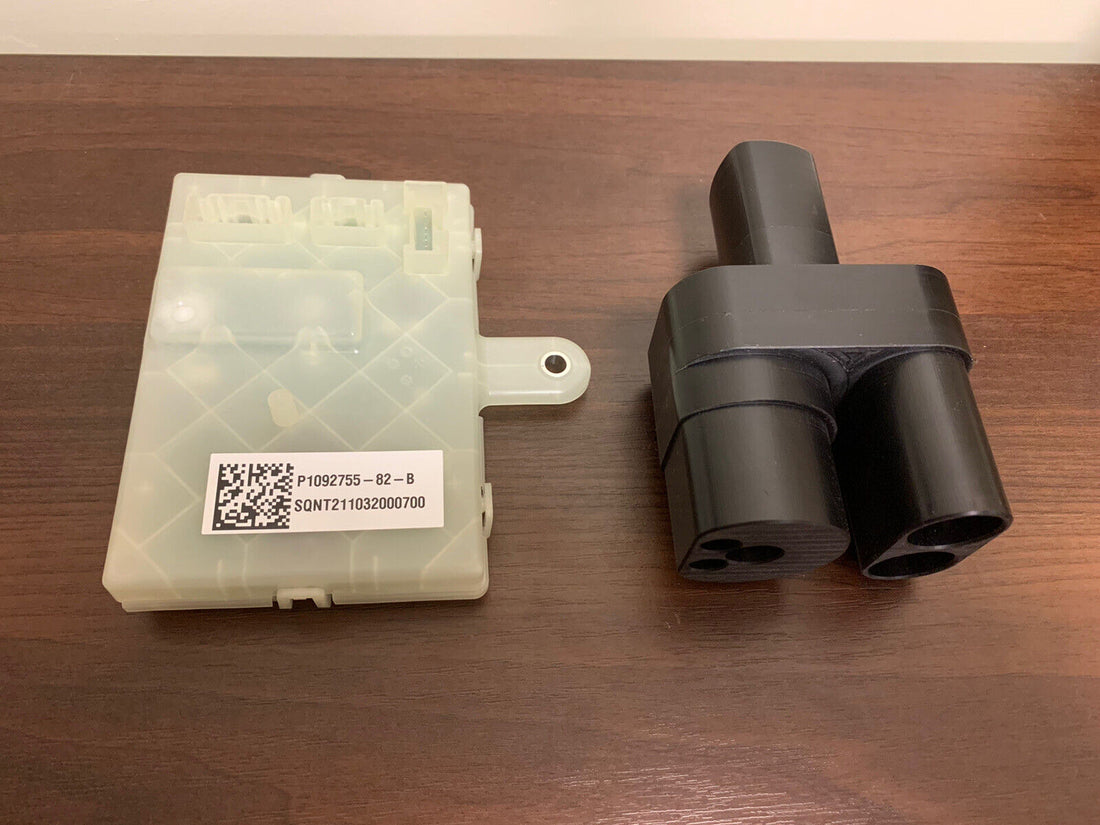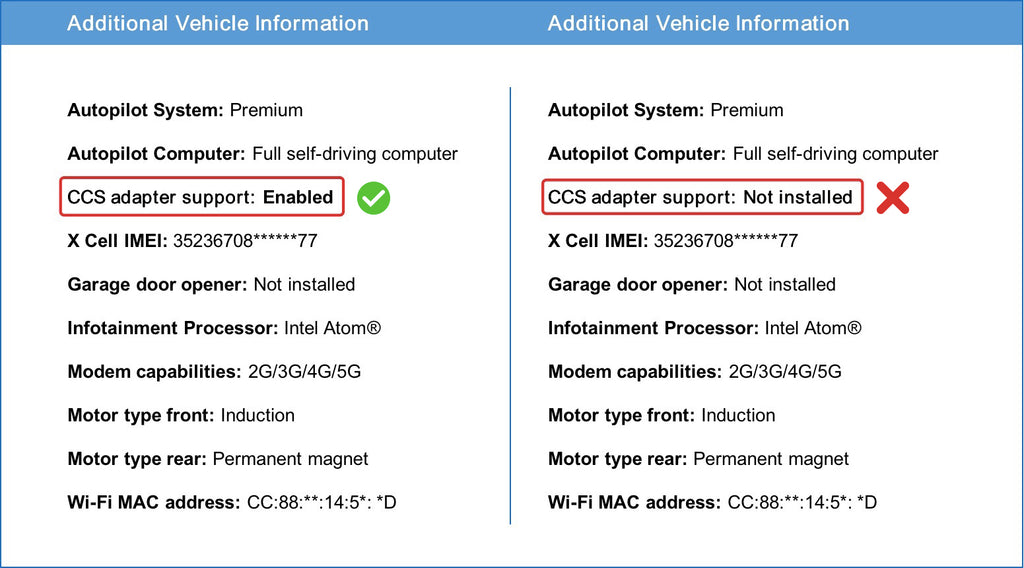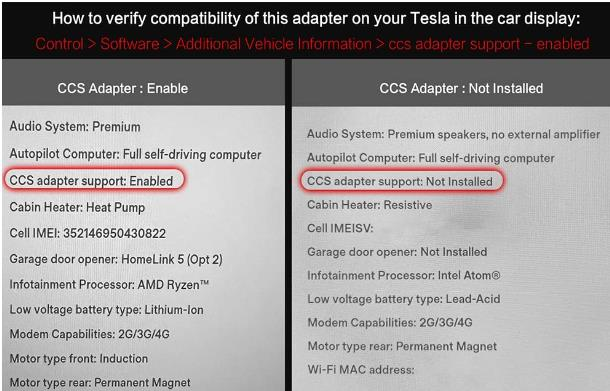
What Is CCS ECU Retrofi For Tesla
Kyle BrianShare
To better read the full article, we first need to understand the first question, what is an ECU?
Contents
What is CCS ECU Retrofit for Tesla?
The full name of ECU is An electronic control unit(Hereinafter referred to as ECU).CCS ECU retrofit is an upgrade for Tesla electric vehicles (EVs) that enables compatibility with the Combined Charging System (CCS) charging standard. Tesla vehicles originally come with a proprietary charging connector and network (Tesla Supercharger), which is different from the CCS charging standard widely adopted in North America and Europe.
By installing a CCS ECU Retrofit, Tesla owners can expand their charging options, giving them access to CCS-compatible charging stations in addition to Tesla's Supercharger network. The CCS ECU Retrofit enables Tesla vehicles to communicate with CCS charging stations using the PLC (Power Line Communication) signal. PLC is a communication protocol used in the CCS charging standard to facilitate the exchange of information between the electric vehicle and the charging station.
When a Tesla vehicle with a CCS ECU Retrofit is connected to a CCS charging station, the vehicle and charging station exchange information through PLC signals. This communication ensures proper charging by negotiating charging parameters such as voltage, current, and other necessary information. By supporting the PLC signal, the retrofit allows Tesla vehicles to charge seamlessly at CCS charging stations, greatly expanding their charging options beyond the Tesla Supercharger network.
This upgrade can be particularly useful for Tesla owners in regions where CCS charging infrastructure is more prevalent than Tesla Superchargers or where they want to have more flexibility when it comes to charging their EV.
It is important to note that Tesla has started to offer CCS compatibility as a standard feature for newer models in certain regions. However, the CCS ECU Retrofit is still relevant for older Tesla vehicles that lack native CCS support. Some models may not have an ECU control panel, such as the Japanese series Tesla.
Installation reference video
How to confirm whether your Tesla vehicle supports CCS?
- Turn on your vehicle and open the system settings on the front touchscreen.
- Choose "Software" from the menu.
- Then, choose "Additional Vehicle Information."
- Under Additional Vehicle Information, look for "CCS adapter support: Enabled."
If the "CCS adapter support: Enabled" is displayed under Additional Vehicle Information, it means that your Tesla vehicle supports CCS charging. If this information is not available or indicates that CCS support is not enabled, your vehicle may require an adapter or retrofit to enable CCS charging compatibility.


Resistorless CCS2 Adapter
This adapter is designed for Tesla vehicles without built-in resistors and ECU support for CCS charging. Owners of these vehicles need to install an additional ECU box to enable CCS charging. This adapter is compatible with the following Tesla models:
- Tesla models from 2018/2019 (require additional ECU box)
- Tesla Model S manufactured before February 2020
- Tesla Model X manufactured before February 2020
- Tesla Model 3 manufactured before June 2020
- Tesla Model Y manufactured before June 2020
Resistor-added CCS2 Adapter
This adapter is designed for Tesla vehicles with built-in resistors and ECU support for CCS charging. Owners of these vehicles do not need to install an additional ECU box as their cars are already equipped with the necessary hardware. This adapter is compatible with the following Tesla models:
- Tesla Model S manufactured after February 2020
- Tesla Model X manufactured after February 2020
- Tesla Model 3 manufactured after June 2020
- Tesla Model Y manufactured after June 2020
For Tesla Model 3 and Model Y vehicles, it is essential to use an ECU with the version number: Gen4 ECU 1537264-00-B. If a Tesla Model 3 or Model Y has the ECU version 1537264-80, it cannot charge using CCS and must be updated to the ECU version 1537264-00-B.
In summary, the main difference between the two adapters is the resistor support. The resistorless CCS2 adapter is designed for older Tesla vehicles that require an additional ECU box for CCS compatibility. In contrast, the resistor-added CCS2 adapter is designed for newer Tesla vehicles that already have built-in resistors and ECU support for CCS charging.

The user can easily distinguish between the resistorless CCS2 adapter and the resistor-added CCS2 adapter using this table, which outlines the desired functionality and compatibility with different Tesla models.
To purchase such products, you can refer to Kyle's advice
- Compatibility: Ensure that the customer selects the appropriate adapter based on their Tesla model and manufacturing date. Using an incompatible adapter could lead to charging issues or potential damage to the vehicle or charging equipment.
- ECU Version: For Model 3 and Model Y vehicles, it is crucial to use the correct ECU version (Gen4 ECU 1537264-00-B) to enable CCS charging. If the vehicle has an incompatible ECU version, it must be updated to the required version.
- Installation: It is recommended that customers have the adapter and any additional hardware, such as an ECU box, installed by a professional technician or authorized service center to ensure proper installation and avoid potential damage to the vehicle or voiding the warranty.
- Charging Safety: Remind customers to follow proper charging procedures and safety guidelines to avoid accidents or damage to the vehicle and charging equipment. This includes ensuring that the charging station is compatible with the vehicle and adapter, following the manufacturer's guidelines for charging, and monitoring the charging process.
- Warranty Implications: Modifying a vehicle with aftermarket products like a CCS2 adapter could potentially void the manufacturer's warranty or impact the coverage. Customers should be aware of any potential warranty implications before proceeding with the modification.
- Local Regulations: Some regions or countries may have specific regulations or requirements for electric vehicle charging and aftermarket modifications. Customers should ensure that their modifications comply with local laws and regulations.
2 comments
Hello
Can you please let me know if a US 2014 Tesla Model S can use the Tesla supercharger network in Europe (Italy) and/or what kind of hardware changes are necessary to enable it?
Thanks
Hello
I am planning to take my 2014 Model S to Europe. Is retrofitting it with a CSS2 adapter sufficient to be able to supercharge over there?
Thanks